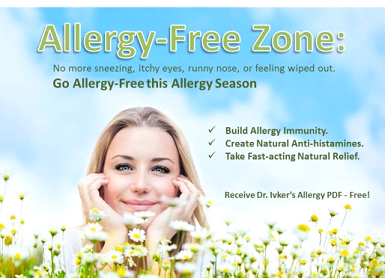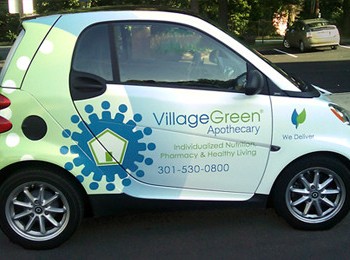Allergy-Free Zone Part 2 – Eliminate Allergies Naturally! 3 Simple Steps
For the severe allergy sufferer looking for the underlying causes to stop their allergy condition. By, Dr. Rob Ivker

If you read Part 1, you now have the Quick-Fix for stopping an allergy naturally as well as a way to build your immunity to allergies so you don’t get them in the first place. Hopefully you’ve gotten started on that plan. Please review that post if you haven’t already.
Are you a severe allergy sufferer? Learn the underlying causes of allergies.
If you’re a sinus sufferer, have chronic sinusitis, and seasonal allergies, hayfever and allergen sensitivities you’ll want to learn the underlying causes so you can eliminate them. Most people are surprised to find out that their allergy isn’t just a pollen allergy, but is caused by other factors.
What are Allergies?
Allergies play a significant role in contributing to the chronic sinusitis of at least half of the 40 million sinus sufferers. A genetic predisposition, a dysfunctional or hyperreactive immune system, airborne allergens (pollen, mold, animal dander, dust mites, chemical exposures, etc.) and emotional factors are the primary triggers for precipitating allergy symptoms.
Along with the above factors, polluted, dry, and cold air can act as an irritant that over the years can cause the nasal mucous membrane to become extremely sensitive and hyperreactive to pollen, mold, dander, dust, and smoke. A Food Allergy can have an effect on the mucous membrane, that can cause yellow-green postnasal mucus drainage. And this reaction can take place within a matter of minutes of eating the offending food. Lets review each one below:
Food allergy ranks as one of the most common conditions in the United States, with as many as 12 million sufferers. Compounding this problem is the fact that millions of Americans are unaware that they are having negative reactions to the foods they eat. Ironically, the foods to which we react are the foods we crave the most (and eat almost daily – see above list). A more serious and increasingly common complication with wheat and other grains, is a sensitivity or allergy to gluten. Gluten is the protein in wheat and other grains that gives the dough its tough elastic character. Besides wheat, gluten is also found in seminola, rye, barley, bulgur, spelt, kamut, oats and many wheat starch products, such as binders in prescription drugs as well as supplements.
Milk is also a common food allergen contributing to hay fever. It is the protein in milk (casein), not the fat, that is the offending allergen. Therefore, low-fat, skim, acidophilus-enriched milk, as well as ice cream, can all be a problem. In aged cheese, cottage cheese, and yogurt, the protein is partially broken down and the antigenic effect is not as great. In most cases it is the cumulative effect of the milk, pollen, mold, and pollution that causes the severe allergic reaction. I’ve found that people suffering with fungal sinusitis are highly prone to food allergies and sensitivities.
The Candida-Control Diet, available to Sinus Survival Gold Members, is also hypoallergenic, with all of the most common food allergens eliminated. If you suspect a food allergy, then I’d suggest you follow this diet for at least a month. Evaluate how your nose and sinuses have responded to this diet by using the Symptom Chart to measure your progress. If your condition has improved with diet alone (without having added any new supplements), then you’ve confirmed the diagnosis of food allergy or sensitivity. Then begin adding new foods at the rate of one new food every 3 to 4 days, while carefully monitoring your symptoms. If you have a strong or an obvious reaction, e.g. increased congestion, mucus, headache, bloating, gas, increased urination; then you’ve identified a food that should be eliminated from your diet.
In addition to the Candida/food elimination diet, Doris Rapp, M.D., author of Allergies and Your Family, recommends the following method for detecting food allergies. Take your pulse in the morning, on an empty stomach. Count your heartbeat for a full minute. Then eat the food you wish to test. Wait 15 to 30 minutes, then retake your pulse. If your heart rate has increased by 15 to 20 beats per minute, chances are that you are sensitive to the food you ate.
You’ll need to be a good detective here and also not rule out a food when it might be a spice in or on the food. I had a patient who ruled out eggs, but later found out that it was the pepper that he was sprinkling on his eggs, that was the culprit, not the eggs. He was under a constant state of congestion and heightened allergies as he ate eggs in the a.m., then had a burrito (with peppers) quite often. He loved his peppers and this was his main issue driving his severe allergies.
Fungal Sinusitis can heighten the allergy response as well as limit nutrient absorption. If you’re a chronic sinus sufferer, I would also take the Candida Questionnaire in the Silver or Gold Membership. If you determine that you have fungal sinusitis, I would recommend following the Sinus Survival Candida Guide and tutorials for Gold Members. Eliminating candida overgrowth will have a chain effect to stop sinus inflammation, congestion, mucus and other symptoms. With the proper G.I. balance, your body will absorb nutrients more efficiently to build a strong immunity, to build allergy immunity and to lessen the severity of allergies.
Airborne Allergies: Unlike the frequent ineffectiveness of antibiotics in treating sinus infections, the conventional medical treatment for allergies, including non-sedating antihistamines and steroid nasal sprays usually serve as an effective quick fix for seasonal pollen allergy. They do have draw backs in how they make you feel.
Also, why wait to fill miserable, then have to take an allergy medication if you don’t have to? If you are not satisfied with the conventional approach, would like to complement it or try a no medicated alternative, or you have perennial (year-round) allergies, it is possible to treat your allergy effectively, either airborne or food, without drugs and their potential toxic side effects. I would start with my recommended components from the first post including:
1). Pathway Grapeseed Extract
2). Plantiva AllerDx
3). Sinus Survival Allercide
The Key to Finally Eliminating Allergies is to find out what is causing them in the first place. Once you isolate these contributing factors, you can solve the mystery which is creating your symptoms.
Sign-up for your free Sinus Survival membership and receive the full Allergy-Free Zone Document and more, click here >>
Dr. Rob Ivker
Author, Sinus Survival
Founder, Fully Alive Medicine






Leave a Reply